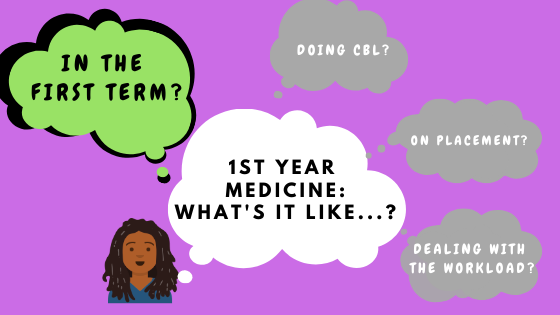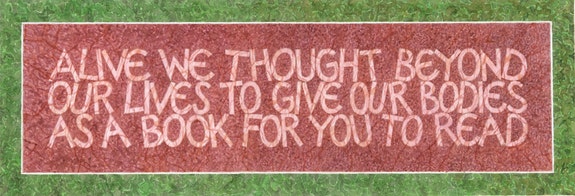PART 1: What’s it like in the first term?
19 Mawrth 2020
So let’s get started! Firstly, I’ll talk about the very first week, which like all other courses, is the induction week! Then, I’ll jump into some details about PCS (Platform for Clinical Sciences) in FAQ style. Happy reading!

So what happens in the induction week?
Throwback to my very first day – Medsoc organised a massive walking bus to walk medics from Talybont accommodation to the med school so that we didn’t get lost on our first day! We had an hour of meet & greet – walking into a room of 300 strangers + staff was very weird, but having been part of group chats beforehand, it was great to put a face to people that I had been chatting online with already!

The rest of the week consisted of lots of talks to meet the important staff, who introduced key components of the curriculum to us. However, most importantly, we collected our lanyards, maroon stethoscopes and lab coats! We also had the opportunity to go to freshers’ fayres to sign up to societies and also signing up to BMA & MDU – incredibly important services to be aware of from day 1! There were a lot of icebreaker activities – one of the most interesting was getting to meet my medic family – consisting of 2nd year parents and 1st year siblings!

This quote really does encompass some important points! First of all, I remember when I first got access to my timetable, an example of October shown below, and the first thing that struck me was not having half terms or reading weeks like other courses had!

Although there were many 9-5s, in actual fact, there were breaks in these days to get work done such as on a Thursday 2 lectures in the morning 9-11 then a tutorial in afternoon 2-5pm.
As Buki perfectly stated, I learnt to work smartly to use time in the day so that I could use more time in evenings to enjoy societies and meeting friends. Plus, similarly to my sixth form, all Wednesday afternoons were off to do sports, activities or use extra time to work as well!

So how exactly is PCS organised?
PCS is organised into 3 units, which each last between 3-4 weeks. In these weeks, you learn a variety of information to ensure you have a good overview of:
* Anatomy
* Human physiology
* Biochemistry
* Other important topics such as: sociology, psychology and some maths!
Maia picked up on another important note which is that you will realise that prior to entering Year 1 – everyone has learnt differently, whether that may be different boards for A Levels or other types of qualifications + degrees or taken a gap year. Therefore, it is essential that the foundation is set the same for everyone. In the first unit, you will find that a lot of the information you may actually already know and is a great recap of A level content as Buki said, but as you go further into term, they introduce concepts which increase in difficulty and content. However, I found that it was structured very well and I will delve deeper in dealing with the workload in the 4th part of this subseries!
So how is the information taught?
* Lectures (also referred to as Plenaries): The slides for most lectures are usually up in advance for you to get a grasp of what will be explained and the majority are also recorded for you to watch through or pick out bits that you didn’t hear fully as well. There are many lecturers who teach from medical education staff to biosciences to clinicians advanced in their fields to teach as well! Lectures are for the whole year group so around 300 for each lecture!
* Tutorials: These are smaller group sessions of about 30, which are great to get to know people on a smaller scale. They are designed to help you improve group working skills and self-directed learning which is great transition for CBL. There is pre-reading for all tutorials , in the form of textbooks, YouTube videos and other which you smartly learn to pick out the key information. This gives you knowledge to share with your table of about 5-6 people on the day so that you can tackle questions at tutorials together.
* Practicals: There aren’t as many practicals compared to the top two learning styles that I have spoken about, but they are useful to learn more histology (aka microanatomy) and build on lab skills using microscopes, pipettes etc. Again, these are usually on a smaller scale and tend to work in pairs,
* Dissection: The only thing I can say about the experience of full body dissection is AMAZING. You get to experience a range of systems which helps to see the diagrams in textbooks in 3D. There is a beautiful plaque on the wall of the anatomy centre, which reminds us of our gratitude for donors for this opportunity:

They also introduce some clinical skills sessions in the first term where you begin to learn techniques such as monitoring vital signs and also introduce communication skills such as basic history taking.

You’ll have noticed in all of the quotes – they have mentioned that everything is covered in case based learning which is so reassuring because although a lot of information is slotted into one term, you review everything = SPIRAL CURRICULUM!
What facilities do you use in the first term?
So you are split between two sites in first year:
* Cathays (main) campus where you have anatomy and practicals and some lectures
* Heath Park campus where the medical school and University Hospital of Wales is based – there is a library where you can find all the textbooks you need a students’ union, eating places and other buildings where you have lectures.
I encourage you to check out the virtual tour facility to have a better look at the campuses!

I hope I have been able to give you a better insight into PCS and please feel free to ask more questions by commenting below or messaging me on my Unibuddy account. Go back to the intro blog to find the other parts of the subseries!
- Advice for Students
- After University
- Ail flwyddyn
- Application Process
- Application Process
- Applying to University
- Arian
- Aros gartref
- Astudio
- Byw oddi cartref
- Cardiff University Experiences
- Chwaraeon
- Clearing
- Clybiau a chymdeithasau
- Cooking
- Cyd-letywyr
- Cymraeg
- Darlithoedd
- Dim ond yng Nghaerdydd
- Exams
- Global Opportunities
- Guest posts
- Heb ei gategoreiddio
- Medic Tips
- Mynd allan
- Neuaddau Preswyl
- Open Day
- Opportunities
- Postgraduate Study
- Rhentu tŷ
- Student Heroes
- Student Life
- Studying Online
- Swyddi a phrofiad gwaith
- Teithio
- Things to do in Cardiff
- Top Tips
- Trydedd flwyddyn
- UCAS Application
- Why University?
- Ymgartrefu